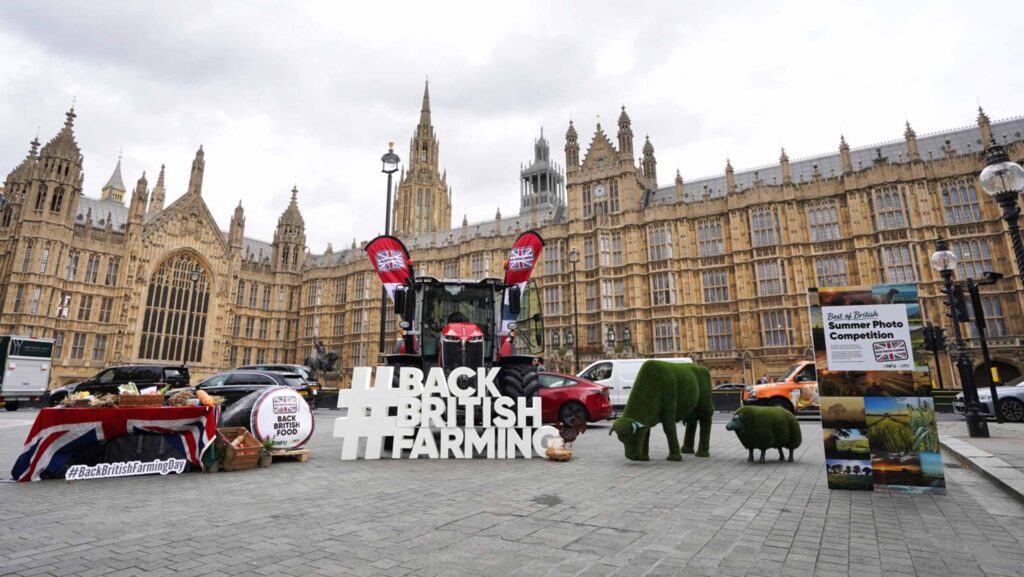This Week in Farming: Defra debacles and drills
 © NFU
© NFU Welcome to the latest edition of This Week in Farming, the quickest way to catch up on the biggest stories from Farmers Weekly over the past seven days.
Before we get to them, here’s your latest market prices, where finished steers broke above £5/kg deadweight for the first time, and feed wheat climbed up to £178/t.
Westminster woes
MPs donned their wheat sheaves in parliament for the NFU’s Back British Farming Day on Wednesday 11 September this week, but in the background, a storm was brewing.
It was revealed that Defra failed to deliver £130m of funding in the last financial year, which the NFU described as a “kick in the teeth” to farmers, while underspends of £103m and £125m were also confirmed for previous years.
In this week’s editorial leader, news and opinion editor Philip Clarke suggested that, as a “tough” Autumn Budget looms, the industry needs a bigger pot, not a shrunken one, if it is to deliver on the government’s objectives.
Labour has not yet confirmed whether there will be cuts to the farming budget and remains under pressure.
On Tuesday, Lib Dem MP Alistair Carmichael took the top job as the new chair of the Environment, Food and Rural Affairs (Efra) committee, and will be tasked with scrutinising Defra policy and spending.
However, the fate for Baroness Kate Rock was not quite as rosy, with the author of the Rock Review being dropped from Defra’s board of directors by Defra secretary Steve Reed.
Food supplies
Vast areas of land could be taken out of food production for solar sites, following the government approval of three major solar farms. The news received a mixed welcome from industry, with good returns available for landowners, but some tenants at risk.
Meanwhile, a survey of 3,900 farm businesses found that landlords entering agri-environment schemes was the main reason given for tenant farmers having to surrender land.
Less land for producing food is not the only concern though, with research by Sustain suggesting that extreme weather could lead to climate-induced food shortages, and even civil unrest.
The weather has already begun to play a part, with the UK facing it’s third-worst cereal harvest in 40 years, according to figures from the Energy and Climate Intelligence Unit.
Trouble continues further down the supply chain, with the British Meat Processors Association saying the abattoir sector is near ‘tipping point’ with just 203 abattoirs remaining in the UK.
Bluetongue
Bluetongue cases continued to spread into new parts of England, with Essex recording its first confirmed case earlier in the week, followed by Lincolnshire.
Farmers Weekly chief reporter Phil Case took a detailed look at what farmers need to know about the disease, including movement restrictions, symptoms, and vaccination.
Drills on demo
As part of our drilling special, the FW machinery desk has been busy mapping the manufacturers of seed drills across Europe, as well as reviewing the Alien System combi pairs air drill with plough.
Arable correspondent Louise Impey looked at how to introduce the SFI no-till action into cropping, discussing with independent agronomists how best to implement it and what pitfalls to avoid.
Finally, on the markets we looked at the price of seed this autumn, which varieties were selling well, and the use of farm-saved seed.
What’s up and what’s down?
A bumper spring barley crop has reduced the premium for malting over feed barley with yields and quality coming through better than expected.
Ram sales have been getting under way all around the UK with prices up on the year, supported by a higher finished lamb price.
Finally, milk markets continue to climb with Meadow and Freshways both announcing higher farmgate milk prices this autumn.
Listen to the podcast
Don’t forget to tune into this week’s FW podcast with Johann Tasker and guests.
You’ll find it anywhere you listen to podcasts, or free to listen to on our website.
